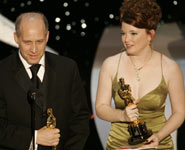Seymour Hersh, at the New Yorker, filed an article the other day laying out Bush administration plans for military strikes against Iran, in order to, as a former defense official told Hersh, "'humiliate the religious leadership and lead the public to rise up and overthrow the government.'" But this former defense official then added, “'I was shocked when I heard it, and asked myself, "What are they smoking?"'" And then there was this paragraph:
One of the military’s initial option plans, as presented to the White House by the Pentagon this winter, calls for the use of a bunker-buster tactical nuclear weapon...against underground nuclear sites.... The elimination of Natanz would be a major setback for Iran’s nuclear ambitions, but the conventional weapons in the American arsenal could not insure the destruction of facilities under seventy-five feet of earth and rock, especially if they are reinforced with concrete.
Hersh is one of the great reporters, with impeccable sources, which is why he infuriates the Bush administration--he keeps saying in public things they want to keep very, very private. So when Sy Hersh writes that the Pentagon is considering tactical nuclear strikes on Iran, I have to take such an allegation seriously.
As I said up front, I don't know what the right solution is to the Iran problem. I have a hard time believing we're even capable of military action anywhere else in the world right now; and if we're fighting in Afghanistan, Iraq and Iran, wouldn't we all be forced to admit, finally, that our leaders have engaged in a new Crusade against the Muslim world?
There is a point to be made that, in the event air strikes are in fact called for (a point I am not yet willing to concede), the tactical difficulty of striking a target deeply buried under rock and concrete is daunting, and that a nuclear device might be the only weapon capable of penetrating deeply enough to be truly effective. But there is a bigger question that the Pentagon does not seem to be considering: the moral question.
After the Hiroshima and Nagasaki bombings, the use of nuclear weapons became the new Rubicon, the barrier that, once crossed, changes everything. MAD was mad, but it also seems to be effective. A nuclear strike became the one place no one dared to go, understanding that even if a military victory resulted, the loss of moral authority would be total and irreversible. Put it this way: if the United States should ever use a nuclear device in any Islamic country, we can forget about winning over any hearts and minds in the region for the next century at least. So anyone who thinks that such a strike in Iran would "lead the public to rise up and overthrow the government" is suffering the worst kind of delusion and needs to be replaced in his job immediately.
MoveOn.org has started an online petition urging our legislators to make very clear their opposition to this nonsense. I don't sign everything that MoveOn sends me, but for this one there was no hesitation. Here's hoping it does some kind of good, somehow.
(Oh, and by the way: I'm fairly convinced that President Bush's mispronunciation of "nukular" is deliberate, a down-home touch from the mind of Karl Rove. Because they really do think that little of us.)


